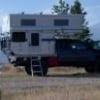What is the best way to keep your water lines and pump safe in cold temps? I am the new owner of a 2014 Hawk and want to make sure to avoid any burst lines or damage to my water pump when the camper is in the driveway overnight in the spring here in Montana (no water heater). Researching this it looks like a lot of folks drain the tank and leave the faucet and cabinet doors open when it gets cold. This is easy enough, but wouldn't fully drain the pump correct? This temporary winterization should be ok if its not terribly cold overnight, 25 degrees F ish? but what if it gets down in the teens? Should I leave the heater on for a while to warm it up before bed? Install additional insulation inside the cabinets or surrounding the pump? Any input is much appreciated - noob trying to avoid rookie mistakes!
Water lines and pump, how cold is too cold?
#1

Posted 06 April 2021 - 08:55 PM
#2

Posted 07 April 2021 - 12:44 PM
For winter storage in truly cold temps, I recommend draining the tank and blowing out the lines. On my camper, I also pump RV anti freeze into the lines. You can make a short piece of PEX line that attaches to the input side of the pump, to pull anti freeze from the bottle and through the pump, into the lines. Some campers have that already.
For short periods of time, keeping heat on, with opened cabinets and faucets as you mentioned works.
My recommendation is to fully winterize, and use water containers for winter camping.
I am haunted by waters
#3

Posted 07 April 2021 - 02:46 PM
Good tip on the pex/anti freeze for longer term storage. What overnight lows do you look for before you start turning the heat on at night? It's supposed to be 26 here on Thursday night. Do you typically just set the thermostat to 50 or so and leave it on all night or just run it a while before bed and call it good? If it's common practice to leave the heater on in a camper without being around I'll go for it, but it seems like a fire risk.
#4

Posted 07 April 2021 - 03:07 PM
If it’s freezing, I set it on the lowest thermostat setting, 45° on my thermostat, and I do leave it on all night.
In a pop up, an electric heater would do the job... if you’re on shore power.
I am haunted by waters
#5

Posted 07 April 2021 - 04:09 PM
A few years ago, notwithstanding my winterization efforts (draining, blowing out lines, adding pink anti-freeze), a drop of water inside my pump froze, expanded and ruptured a diaphragm in my pump. I now remove the pump as part of my winterization. The task is made much easier per a DIY mod of mounting the pump on a board, which is fixed to the cabinet via threaded inserts and screws. It's a <5 minute project each fall and spring.
FTR, we use our camper for mid-winter ski trips. YMMV
#6

Posted 07 April 2021 - 06:32 PM
Good tip on the pex/anti freeze for longer term storage. What overnight lows do you look for before you start turning the heat on at night? It's supposed to be 26 here on Thursday night. Do you typically just set the thermostat to 50 or so and leave it on all night or just run it a while before bed and call it good? If it's common practice to leave the heater on in a camper without being around I'll go for it, but it seems like a fire risk.
I may be an outlier here, but we use our camper and water system in the winter so I end up winterizing the camper 5-6 times per year. I just empty the water tank by running the faucet, then open the drain valve to get a little more water out. We have a water heater, so I drain that back into the main tank first. I then run the pump dry, and if I think of it, unscrew the little filter cup and dump the water from that too. Takes about 5 minutes and so far in 5 winters, no problems.
The one exception is the outdoor shower - there is a low point in the plumbing for that which won't gravity drain so I added shutoff valves for that and blow it out with our on board compressor at the end of the season and leave it shut off all winter.
2016 Fleet Flatbed
2016 Toyota Tacoma
#7

Posted 08 April 2021 - 02:10 PM
I have to admit, I didn't do anything special w/ my camper this winter. I used a lot over the winter, so didn't really want to put antifreeze in it, etc. But it sat out unused over a bunch of 20 degree nights, and down to below zero a few times. All I did was open the faucet on the sink, open the outside drain valve. Open all the hot water valves. Then drive home after camping and hope it all got shaken out of the pipes..
The one area I was concerned about and don't see how it could have drained, is the line going to the toilet. It has a long low area. And my thought about it not bursting is that the lines are plastic. They can expand a bit. Plumbers literally say that when specing PEX for a new home build.. "Oh this is sooo much better than copper. Never have to worry about pipes freezing because it expands".
OTOH, I know people here have had their pipes burst, so.. Maybe I got lucky.
#8

Posted 08 April 2021 - 03:26 PM
This is great stuff. I think we will end up doing jugs for winter camping to play it safe, we will probably just be going out for a few truly cold weekends per year skiing/hunting. I will probably end up plumbing in releases to remove the water pump as it definitely does not look cheap to replace. Sound like the pump is the biggest weak point of the system as far as freezing goes.
Has anyone heard of damage being done to the outdoor shower if it freezes? If the line can expand it seems like it might be alright even if ice forms in there?
#9

Posted 08 April 2021 - 03:38 PM
Snowman, if you blow out the lines, then run pure RV antifreeze through your pump and into the lines, there should be no issues with the pump. IMO, removing the pump is overkill.
The issue with the outdoor shower (assuming it’s not a quick disconnect) is probably going to be the fixture itself. Blowing it out and RV antifreeze should cover it.
I am haunted by waters
#10

Posted 08 April 2021 - 03:50 PM
This is great stuff. I think we will end up doing jugs for winter camping to play it safe, we will probably just be going out for a few truly cold weekends per year skiing/hunting. I will probably end up plumbing in releases to remove the water pump as it definitely does not look cheap to replace. Sound like the pump is the biggest weak point of the system as far as freezing goes.
Has anyone heard of damage being done to the outdoor shower if it freezes? If the line can expand it seems like it might be alright even if ice forms in there?
The outdoor shower (on the flatbeds anyway) is a weak point for freezing - the way it is plumbed, water sits in the fittings. It sounds like water freezing in the pex lines is not a big deal, but the fittings are rigid and if water freezes in the fittings they can crack. As I mentioned before, we blow the shower out and added shut offs so we can isolate it for the winter.
I have never had a problem, just running the pump dry, no blow out or anti freeze. Removing it seems like overkill, if you were to have a problem, they are not all that expensive to replace.
2016 Fleet Flatbed
2016 Toyota Tacoma
0 user(s) are reading this topic
0 members, 0 guests, 0 anonymous users















